Camas Prairie History
June 23, & 24 2007.
We stayed at Mountain
View MH & RV Park in Grangeville. It is a Passport
America Park $14 for FHU, cable & wifi. It isn't a resort
but we had shade and a nice large site in a clean environment 208-983-2328.
If you are looking for a "Resort" Christmas tree RV-Resort
is on US 95 less than a mile from the middle of town.
On the 24th we moved the motorhome to Lewiston about 65-miles to
the northwest where we stayed at the Clearwater River Casino &
RV-Resort. The RV-Park is an old KOA and in bad shape. We would
not recommend it. There are several parks in Clarkston, Washington
that would be much more preferable. Our cell phones work in Washington.
If you have Verizon or Alltel and possibly Sprint you are probably
going to be roaming in most parts of western Idaho
where they are serviced by an "off-brand" cell service that
does not have contracts with the big carriers like Verizon and Alltel.
Things return to normal in Washington.
TV is bad to non-existant at Clearwater River Casino & Resort.
I could go on but won't.
Today the Camas
Prairie consist of patterns alternating between grain & canola
fields
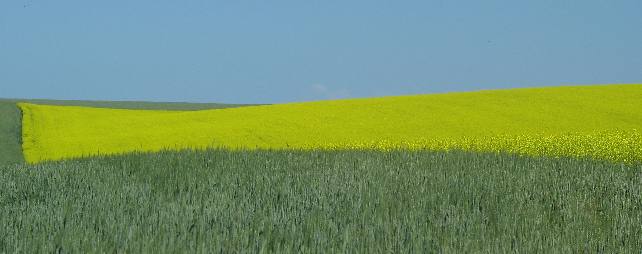
Contrasting patters abound throughout this modern day Camas
Prairie.
This is what Central Idaho
looks like now but it hasn't always looked this way.
During the decade following the discovery of gold in California in
1848, restless brands of prospectors, lured by the hope of sudden
wealth, arrived in what is now north-central Idaho.
In 1860, gold was discovered on Canal Gulch of Oro Fino Creek, a tributary
of the Clearwater
River. Soon after, prospectors traveling over the Nez Perce
Trail discovered gold in Elk City a few miles from the southeast corner
of the Camas
Prairie. A small band of gold-seekers also struck it rich
in the remote Florence
basin. Between September 1861 and October 1874, gold shipments out
of Florence
added up to $13,000,000.
When gold was discovered in Idaho,
a few Chinese filtered into mining camps and communities like Grangeville
to run restaurants and laundries, and doctor the miners with their
country cures, Others settled in the warm canyons along the Salmon
River where they cultivated fruits and vegetables and raised
hogs and chickens to sell to the miners.
After completion of the Central Pacific Railroad, more Chinese flocked
to Idaho when laws allowed
them to buy exhausted mining claims. Historians estimate that in the
1870s, the Chinese accounted for 28% of Idaho's
population. The December 1904 edition of The Standard reported that
Chinese miners shipped more than $5,000,000 in gold from Florence
alone.
Sometimes stories need to be told and the one about Polly Bemis is
one of those stories. Sometimes heart warming stories are about small
people and Polly is one of those. She was only broomstick high and
beautiful -- a dance hall girl. Her real name was Lau Nathoy, but
in the mining town of Warrens, Idaho,
they called her Polly. She was born in China and when she was 14,
her father sold her for some seed and pieces of gold. She was smuggled
into Portland and sold for $2,500. At nineteen, so the story goes,
Polly was the pot of a poker game between her Chinese master, Hong
King, and Charley Bemis, a prominent saloon keeper and mayor of Warrens.
Berris brought her a boarding house and in 1890, when he was shot
in the face in a fracas, Polly saved Charley's life with her crochet
hook. She cleaned out his wound and nursed him back to health.
In 1894, Charley Bemis married Polly; she was 41 and he was 46. Four
years later, they bought acreage and moved to the Salmon
River. In 1922, the Bemi's house burned down and Charley died
a few months later. Their neighbors, Pete Klinkhammer and Charley
Shepp, built a new house for Polly so she could continue to live near
her beloved river.
On a visit to Grangeville in 1923, Polly experienced the wonders
of a move, an automobile, and a train. She lived on the river for
ten more years, but in 1933, at age 81, illness forced her to return
to Grangeville where she died and was buried. In June of 1987, Polly's
wish was fulfilled when her remains were moved back to her place on
the river, now known as ---------- the Salmon River Resort.
Grangeville, on the south end of the Camas
Prairie is the county seat of 8,500 square mile (5.4 million
acres) Idaho County. Grangeville
is also the largest community on the Camas
Prairie, where the population and elevation meet at about
3,500. The area boast a fascinating history, complete with Nez Perce
culture, Chinese lore and tales of gold rushes and the Old West.
This is BIG country. Idaho
County is the nation's third largest county. Bigger than the states
of Rhode Island, Connecticut and Delaware combined. Idaho
County has a small population of just over 16,000. One thing I can
tell you is those 16,000 residents sure do add to the nation's bread
basket.

Camas,
the plant the Camas
Prairie was named for are not nearly what they used to be.
Camas
bulbs, which grow about 4 to 6 inches beneath the ground,
are harvested in a centuries-old tradition by Nez Perce women in August
and early September. The bulbs are then painstakingly prepared and
stored.
As you can imagine the once abundant camas
fields have been destroyed by ranching and farming operations.
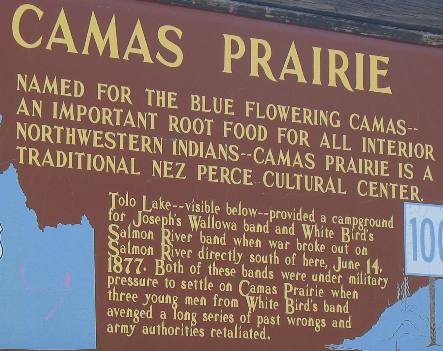
Tolo Lake is located in the southwestern corner of the Camas
Prairie not far from US-95 as it heads over White
Bird Hill and into White
Bird.
Tolo Lake was named for Tolo the Indian woman (Nez Perce) who rode
28-miles on horseback one night to warn her friends that an attack
on them was being planned. The lake was subsequently named for her.
Tolo Lake is located around 4 to 5 miles north of Grangeville. I
want to share the heart warming story to go along with it's name.
War has a way of making heroes and heroines of ordinary mortals.
To some, Tolo, a Nez
Perce Indian woman, was never ordinary. Her given name was
Alab-lemot but, because she loved to gamble, she was called Tolo (in
Chinook jargon, Tolo means "win"). She was strong, determined,
motherly and sometimes feisty.
In 1877, Tolo lived with her sisters and two daughters in the settlement
at Slate Creek and was loved and respected by everyone. When word
came of a possible Nez
Perce uprising, Tolo rode 28 miles to Florence
to warn her friends. She rode all night over a rugged trail, and returned
to Slate Creek the next day with help for the settlers. Florence
was a booming mining town when this incident took place.
The Slate Creek settlers believed that Tolo's efforts discouraged
an attack on the stockade. In appreciation, Tolo was allotted land
off the reservation. Later, a small lake on the Camas
Prairie, where the Nez
Perce camped and held pow wows, was named Tolo Lake in her
honor.
Southwestern corner of the Camas
Prairie around Tolo Lake in western Idaho
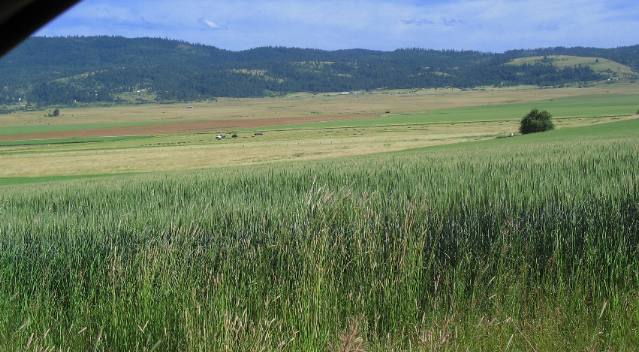
Tolo Lake is a small lake somewhere out there on this, the southern
corner of the Camas
Prairie.
Kiosk at Foster's Gravesite memoralizing an event
in the Nez Perce War
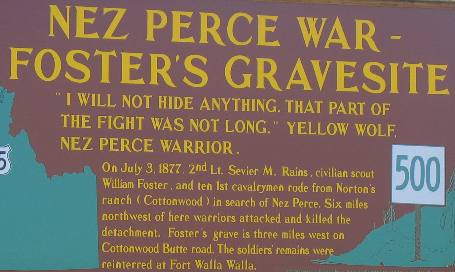
Every few miles we stop to read another history kiosk provided by
the state of Idaho.
Kiosk commemoration Lewis and Clark passing through
the Camas Prairie
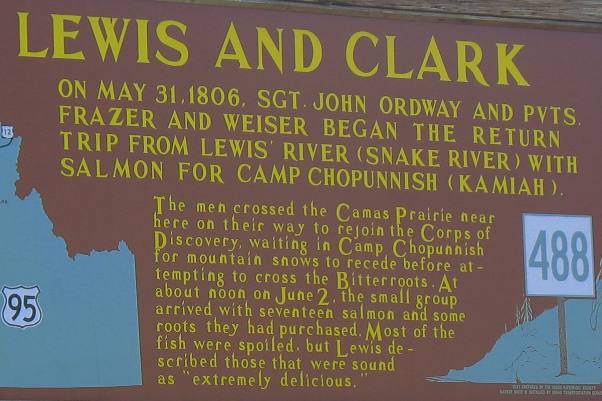
We have read this story in our Lewis and Clark books on many occasions.
Kiosk commemorating an event in the Nez Perce War
that occurred in the Camas Prairie
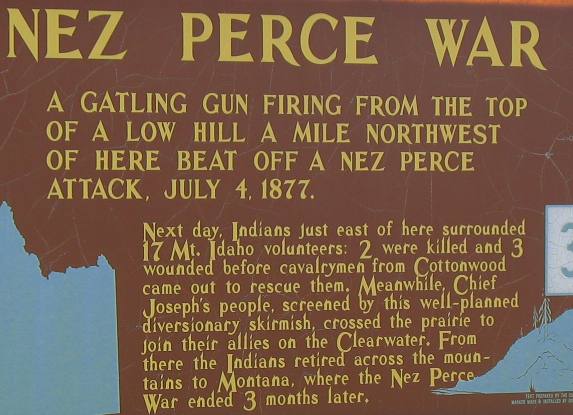
Lawyer's Canyon in the Camas
Valley of western Idaho
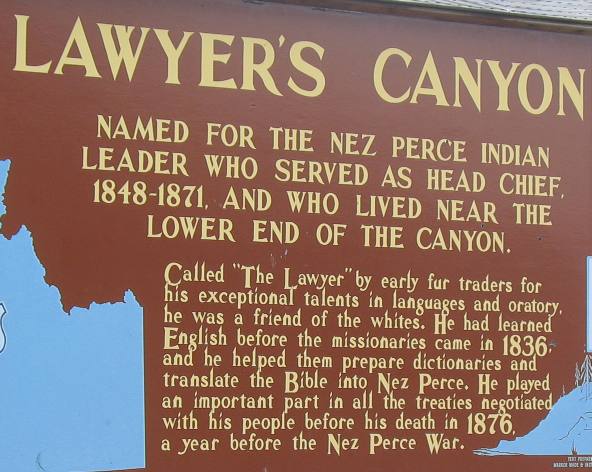
Old Railroad Trestles across Lawyer's Canyon in the
Camas Valley of western Idaho
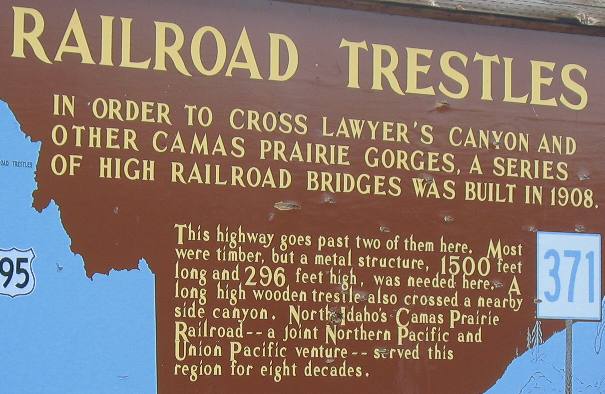
Leaving the Camas
Prairie on the northwestern corner
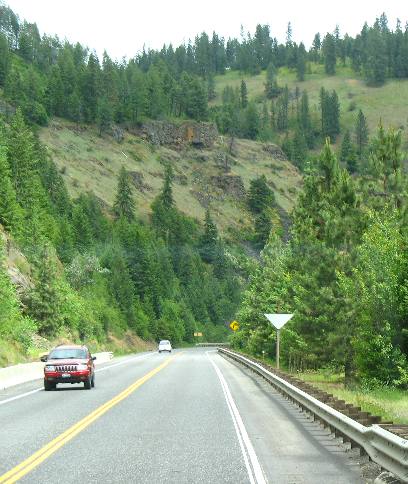
And finally we move out of the prairie as US-95 continues to drop
toward Lewiston.
Lewiston, is located on the lowest elevation in the state of Idaho.
You might have surmised that since it sits at the confluence of two
great rivers the Snake
and Clearwater.
If you don't know the Snake
River turns west from its northern course and heads into Washington
where it will shortly meet the mighty Columbia and continue its journey
to the Pacific.
US-95 exiting the northwestern corner of Camas
Prairie in western Idaho
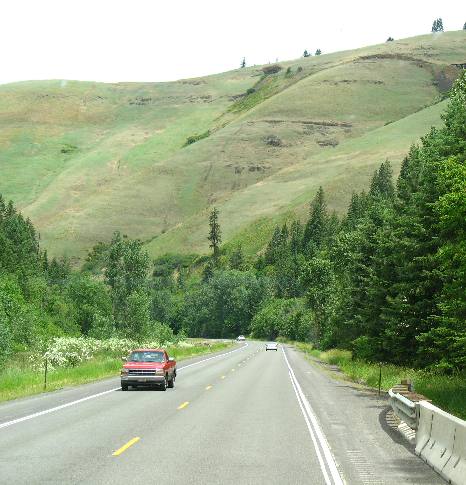
Rivers and highways are all falling on there way to Lewiston. It
seems like we coasted all the way from Winchester to Lewiston. Winchester
Lake State Park is at an elevation of 4040' while Lewiston is at 800'.
You can do the math --- the drop is over 3,000' in around 25-miles.
Dropping 3,000' in 25-miles means that the vehicle does not need much
if any gas and most of the effort is going to be involved in controlling
the downhill speed.
Until next time remember how good life is.
Mike & Joyce Hendrix

Mike
& Joyce Hendrix who we are
We hope you liked this page. If you do you might be interested in
some of our other Travel Adventures:
Mike & Joyce Hendrix's home
page
Travel Adventures
by Year ** Travel
Adventures by State ** Plants
** Marine-Boats
** Geology ** Exciting
Drives ** Cute Signs
** RV
Subjects ** Miscellaneous
Subjects
We would love to hear from you......just put "info" in
the place of "FAKE" in this address: FAKE@travellogs.us
Until next time remember how good life is.



